By Kaydee Donohoo
Staff Writer
For the past two years, Simmons College has had large incoming class sizes of over 450. In order to make room, incoming residents are placed in triples which may cause conflicts, yet leave many students closer to their roommates.

When building or finding new residence halls is limited in the city, more students need a place to live in the buildings already on campus. The quick solution for Simmons is to place first-years into rooms that were built to be doubles, creating new “expanded occupancy rooms” or, as students call them, “forced triples.”
Nearly all the students who are currently in a triple, or were last year are left with the same thought; these rooms are cramped. Cramped rooms have led to some residents disliking one or both roommates. One set of roommates who were forced into a triple described their room as cramped, and then added, “but cozy.”
Most triples on campus are located in Simmons Hall. When entering one of these 165 square foot rooms, the eye notices just how much space beds take up. Two beds are bunked, and a third is lofted to create room for one of three desks. The two tall bed units are just far enough apart to lay down a rug. For storage, roommates share two dressers, while closet space remains the same.
On the third floor of Simmons, one student gets along with the roommate she requested. However, she takes the third roommate assigned to her as an indication that the paperwork “failed” her as she put it humorously. The unrequested roommate has done a number of things to make the living situation difficult, such as shutting off the light for a 5 p.m. nap, but then using a computer for the majority of the night afterwards. Sleeping can be difficult as “she doesn’t use headphones,” the resident confirmed. The roommate interviewed didn’t fill out the form to request a detriple because she didn’t want to lose the roommate she requested and gets along with.
Jess Samuels, Director of Residence Life, explained that pairs of roommates who’ve picked each other during summer orientation may be placed with a third roommate. The selection process of who will be tripled is based on deposit date. Samuels explained that, if it were not based on deposit date, it would place an undue burden on incoming students to rush and find a roommate in order to steer clear of tripling.
Roommates who mutually request each other will always be matched. The remaining students will be placed together based on questions filled out on a survey. Students are asked to mark which questions are most important to them so that the office can focus on making sure these questions match their roommate’s. Questions include sleep schedule, cleanliness, and study atmosphere, along with several others.
Some residents in triples found that the lack of space, difficulty organizing so many personal items, and/or differences in schedules led to passive aggressive moments. One resident found that while she got along with her roommates she noted, “My two roommates are closer, and I am like the third wheel.”
Another roommate had similar thoughts on the odd number dynamic stating, “I feel like I would’ve been better friends with one person, compared to trying to maintain two friendships without trying to make the other one feel left out.”
This is not always the case. The set of roommates who described their room as “cramped but cozy” were happily eating dinner together, explaining that they had such a good time in their triple from their freshman year that they decided to room together again.
For their sophomore year they switched a forced triple into a voluntary triple and got a hall where a three roommates meant getting more, instead of less, space. Any conflicts were small, and centered on how a little room could get cluttered so easily.
“If paired up with the right people, triples can be better than doubles,” explained a Resident Advisor for a floor of almost all triples at Simmons. She explained how if people want to leave it’s usually because of space, but those in triples can actually end up closer.
Twenty-three residents were interviewed who were in forced triples this year or last, with most noting that they didn’t have conflicts. “We very much get along and enjoy living together,” one resident stated. For some it meant always having someone to hang out with.
One resident explained, “We get along very well: the personality/lifestyle matching system really works! There is definitely a lack of space and it can feel crowded even if I’m alone in the room. However, I’ve gotten close to my roommates and wouldn’t go back and change anything. We make it work and we appreciate each other despite the challenges.”
The Simmons website explains that, “Many students who are initially concerned about living in a triple ended up loving it, choosing to remain in the room even when they have the opportunity to move into a double.”
Jess Samuels and those in the Resident Life office work to offer every student who wants to detriple a chance to. In past years each student had the option to with the arrival of second semester and rooms opening up as student move off campus or leave on study abroad. Samuels is confident the same will take place this year.
Samuels explained, when roommate issues come up, roommates can use tools that were given out at the beginning of the year. Roommate contracts are four pages (twice as long as previous years), and include communications styles. If an issue came up, roommates would know who was outspoken about issues, and who might need more prompting to share their mind. If outside mediation is needed for two or more of the roommates an RA will help mediate. A meeting will be set and students will use pre and post mediation worksheets to discuss the conflict and their hopes for a resolution. Students will create a new agreement and sign it at the end of the mediation.
If a student still desires a new room, even if just for space rather than conflicts erupting than that student will be put on a waitlist. Students will be contacted when a room opens, and because the residence life professional staff will get to know that student, may even switch them with another resident requesting out of their particular triple.
Just prior to the school year a special ice cream social was hosted for the first-year tripled roommates, with free movie tickets for attendance. The hope was that after ice breakers, get-to-know you activities, and tips on good communication, the first years would want to go to their free movie together.
“We wanted to give special attention in order show that we recognize that it is a different experience,” explains Samuels of the event, “We want them to know that we care in making it the best experience possible.”











